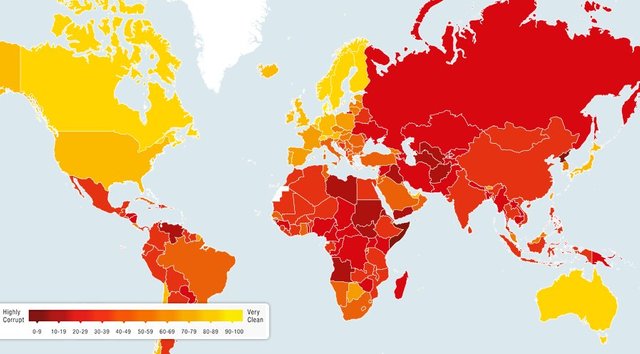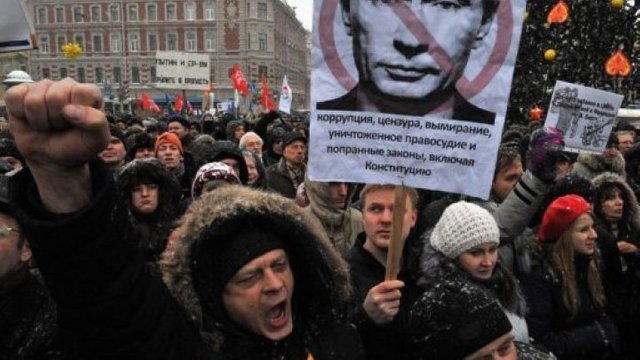How Corruption And The Lack Of Political Stability In Developing Economies Is Slowing Economic Growth
How Corruption And The Lack Of Political Stability In Developing Economies Is Slowing Growth
There are many prime examples in history of various countries who were able to modernize and create prosperity for their people, without any amount of massive resource, skills or benefit. However today we are seeing economies that are reaching a plateau even though economically they are doing everything right, and a large part of this is because of government corruption. Government corruption has for a long time been rampant in many parts of the developing world, but has been near impossible to crack down on in many countries. There will always be corruption, but it is a necessity that if a country wants to move past the developing stage, it must be dealt with.

Some of the world’s most corrupt countries on the Transparency International 2016 rating, are countries that also have large amounts of resources and potential to become large economic powers. One of the biggest factors for a country succeeding is foreign investment, which, for the most part, will not come if a country’s government is corrupt and dealing in undesirable ways. While there have been exceptions in the past, large amounts of investment capital will not take the risk of investing into a country like Russia, Brazil, or Libya if they feel like they are going to be screwed over and have no recourse available to them , or just believe that theres a potential the government wont be there in twenty years. People are afraid to take a bet on Russian bonds and stocks because theres a potential that tomorrow they could break into civil war and all of the money invested would be lost.
There are reasons why countries like the US, which have a long track record of political stability capture the largest amounts of foreign investment in the world. People trust that for the most part their money will be available in 10 or 15 years. Political stability often comes with less corruption and is perhaps the most important building block in today’s modern world. It is very hard to become a strong economy without international investment and by allowing officials to accept bribes and rig elections is only in the best interest of the officials themselves. Sure you can develop a country like China that manufactures and exports goods for cheap, but getting from that point to transitioning into a completely developed economy, in my opinion, will never work with the current structure of government. There are governments in the east that have proven getting rid of corruption would in return bring prosperity, so there is evidence it can work.

Much of my knowledge of economic history is in the east, so ill give a few example of countries that were able to modernize in just a 30 year period because they made a stable government and low corruption, a main focus. Although each of these countries may not be the most free in some cases, the GDP per capita, which is the closest thing to quality of life calculation we have, is very high. Taiwan, Singapore and Hong Kong all made it a main focus to cut down on government corruption when modernizing post World War II. Although they all had various forms of governance and how much of a role the government took in your everyday life, political stability was always the goal. While some like Taiwan took a more strict government policy, they were still able to cut down corruption by paying officials a decent salary and cracking down harshly on anyone who was caught accepting bribes or even just investing in private companies. Others like Hong Kong chose a more hands off Government approach, cutting down on corruption by making the government have little impact on private companies and businesses.
The results were that countries from all over the world flocked to Hong Kong and Taiwan to invest and build needed infrastructure for fledging industries. The direct result of the investment was various strong sturdy industries that provided jobs and economic well being to citizens. Despite having little land and almost no large resource supplies, these countries were able to pass up those with resource networks worth trillions. While countries like Hong Kong and Taiwan see success, countries like Brazil are struggling to get foreign investment, because investors don’t trust them. If you run your country like a mafia, foreign investment isn’t going to risk large amounts of money on you.

Overall, while I do think eventually countries will start to crack down on corruption because they realize it is holding them back, it doesn’t seem to be happening any time soon. In Russia and Brazil we are still seeing rigged elections, government embezzlement and extortion taking place on a massive scale. I focus on these two countries, because they are part of the BRIC countries that are supposed to capture a large part of the international economy in 20-30 years. However they won’t get that way with the current structures they have now. If we start to see leaders crack down on their government I believe in the long term, political stability and foreign investment will come.
-Calaber24p
Agree with the sentiment, now it's just about the way it's being done. For Singapore, it's true they're stamping out corruption by increasing government-servant wages etc. But their reach is entirely draconian, and the free-market is severely cut off at the higher echelons of business activities (and very big government since most facilities are built and maintained by the gov) - this makes it easy to control such a very small country, and allow for pacts with other nations for steady streams of investment. This is why Singapore is experiencing tremendous financial growth while Malaysia seems to be going backward (widespread crony capitalism and just plain corruption).
Sometimes I feel quite conflicted about what's happening. I guess somewhat of a dictatorship works if the leaders know what they're doing. Can an entirely self organised free-market ever make big governments obsolete? I think that can only happen if self-policing happens and members do their respective DDs. (I somehow think something like Steemit is an experiment on the subject matter).
(Btw buddy, one of the images ain't loading - been happening to some posts).
I think political stability is more important than corruption, but imo less corruption leads to more political stability. Taiwan in the beginning was quite draconian as well, but over time they lessened their grip and countries saw a government that, although was tough, was lasting. They had very strict policies, but many of those strict policies were obeyed by everyone so people did not feel like the government was getting away with anything.
I don't think people don't invest in a country because of corruption, if you read the news you will see that the most affluent and prosperous countries in the world are nearly as corrupt as any other country, the problem is the corrupt politicians and the corrupt businessmen who are willing to exchange huge sums of money for favors like tax exemptions, for opening manufacturing plants with most favorable conditions, etc.
No I think investment is made by agreements between the people who have the money and power in this world, they decide which countries to back and which to stab, example price of oil.
Corruption is widespread no country is free of it, though of course I can agree some are more corrupt than others.
Corruption is really all relative though, also you want to look at GDP per capita as a measurement of affluence, because plain nominal GDP can be large enough given the size of the country. The majority of the top 20 GDP per capita countries have very low corruption. The more important thing that brings outside investment is political stability and less corruption leads to political stability in the long run.
I don't know, if read the news you'll see corruption scandals in the US, Great Britain, France etc. so I would say corruption is rampant , in fact in third world countries the thing that happens is that the corrupt people aren't worried about publicity because they are actually above the law, the same corruption happens in the developed countries but the corruption is not so clearly seen, not so well publicized. You tell me what billionaire is in prison, and I bet a lot of that money isn't legal.
In fact I think the only place where billionaires have been doing time is Russia, and mostly because they are Putin's enemies. I still think investments are vetted by powerful people and organizations, they control everything.
But anyway we should all be working towards ending this evil practice, in whatever shape it comes.
Resteemed
This post has been linked to from another place on Steem.
Learn more about linkback bot v0.4. Upvote if you want the bot to continue posting linkbacks for your posts. Flag if otherwise.
Built by @ontofractal